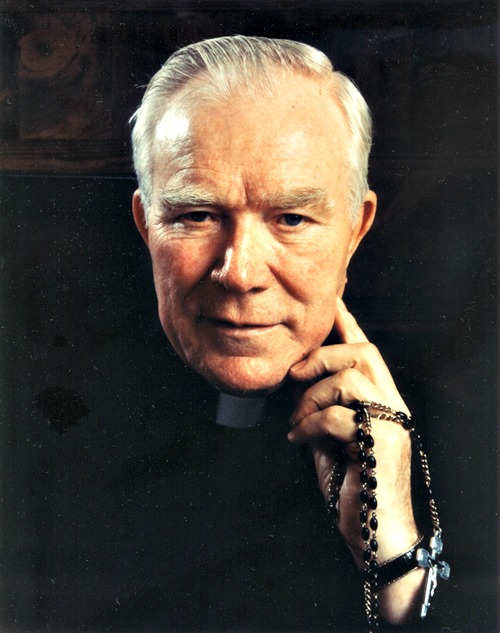Polish Cardinal, ‘Rosary Priest’ Among Sainthood Causes Moving Forward
Pope Francis on Tuesday recognized the heroic virtue of Cardinal Stefan Wyszynski and Father Patrick Peyton, an Irish priest known for his promotion of the Rosary.

VATICAN CITY — Pope Francis on Tuesday recognized the heroic virtue of Cardinal Stefan Wyszynski, the former metropolitan archbishop of Warsaw, Poland, as well as Father Patrick Peyton, an Irish priest known for his promotion of the Rosary.
The Pope recognized the heroic virtue Dec. 19 of six other people on the path to canonization, as well as the martyrdom of Teodoro Illera Del Olmo, priest of the Congregation of St. Peter in Chains, and 15 companions, who were killed “in hatred of the faith” during the religious persecution in Spain in 1936 and 1937.
Miracles attributed to the intercession of diocesan priest Giovanni Battista Fouque (1851-1926) and Jesuit priest Tiburzio Arnaiz Nunoz, founder of the Misioneras de las Doctrinas Rurales (1903-1977), were also approved, paving the way for their beatification.
Francis met Dec. 18 with the prefect of the Congregation for the Causes of Saints, Cardinal Angelo Amato, giving his approval for the causes to move forward.
He recognized the heroic virtue of Cardinal Wyszynksi, now called “Venerable,” who was born in the village of Zuzela in eastern Mazovia (at the time, part of the Russian Empire) on Aug. 3, 1901.
Wyszynski was ordained a priest Aug. 3, 1924, his 24th birthday, celebrating his first Solemn High Mass of thanksgiving at the Jasna Gora Shrine in Czestochowa, where the image of the Black Madonna resides.
In 1946, he was appointed bishop of Lublin and then in 1948 named metropolitan archbishop of Gniezno and Warsaw, thus becoming the “Primate of Poland.”
Often called the “Primate of the Millennium,” he is known for his heroic resistance to Nazism and Communism. He was also instrumental in the approval of Karol Wojtyla (Pope John Paul II) as bishop of Krakow, and later, in urging him to accept his election as pope.
He is also credited with helping to conserve Christianity in Poland during the persecution by the communist regime, which ruled from 1945-1989. At one point, he imprisoned with other Catholic priests during a wave of anti-Catholic persecution, where he witnessed brutal torture and mistreatment of prisoners.
In 1953 he was made a cardinal by Pope Pius XII. He died of abdominal cancer on May 28, 1981, at the age of 79, and is buried in St. John’s Arch-cathedral in Warsaw.
Another cause moving forward is that of Patrick Peyton, now called “Venerable,” who was born in County Mayo, Ireland, Jan. 9, 1909. In 1928 he and an older brother sailed to the U.S. to join his elder sisters who had already emigrated and were living and working in Pennsylvania.

Peyton worked as a sort-of janitor at St. Stanislaus Cathedral for several years before deciding to pursue the priesthood with his brother Thomas.
In 1938, while still a seminarian, he fell gravely ill with tuberculosis. Thinking he might die, his older sister brought him Marian novenas and reminded him of the Blessed Mother and the power of the Holy Rosary.
Encouraged by his sister and a Catholic priest, he gave himself over to God through the Blessed Virgin Mary. Soon, doctors discovered that the spots in his lungs had disappeared; and in 1941 he and his brother were ordained priests of the Congregation of the Holy Cross.
He was one of the first pioneers of evangelism via mass media, using radio, film, advertising and eventually television, utilizing the help of Hollywood celebrities and artists. He is most known for his public rallies to encourage families to make pledges to pray the Rosary together, which were attended by thousands of people.
He founded the “Family Rosary Crusade” and popularized the phrase: “The family that prays together stays together.” In addition to working in the U.S., he also led missions in Latin America and in the Philippines.
Peyton died June 3, 1992 in San Pedro, California, and is buried on the grounds of Stonehill College in Easton, Massachusetts.
The other people declared “Venerable” are: Jesuit priest Alfonso Barzana (1530-1597); Paolo Smolikowski, priest of the Congregation of the Resurrection of Our Lord Jesus Christ (1849-1926); Maria Anna of St. Joseph, founder of the Monastery of the Augustinian Recollect Sisters (1568-1638); Luisa Maria Langstroth Figuera De Sousa Vadre Santa Marta Mesquita e Melo, founder of the Congregation of the Ancelle of Our Lady of Fatima (1877-1973); Anna del Salvatore, sister of the Congregation of the Daughters of St. Anne (1842-1885); and Maria Antonia Sama, lay woman (1875-1953).

















